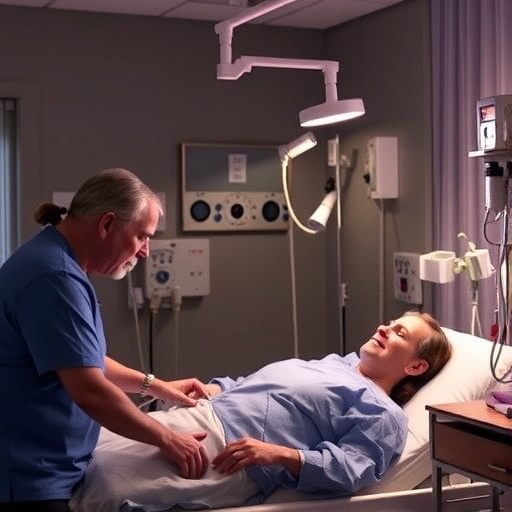In the ever-evolving realm of medical science, the UK Resuscitation Advanced Life Support (ALS) guidelines stand as a cornerstone for clinicians and medical professionals in emergency situations. The guidelines, which serve as a structured approach to managing cardiac arrest and other life-threatening emergencies, are due for a critical reassessment. Recent discussions among experts in the field indicate that it may be time to reconsider the traditional paradigms of resuscitation, particularly in light of emerging evidence and advances in medical technology.
The current set of ALS guidelines was designed to maximize the chances of survival and minimize the risk of complications following cardiac arrest. With their well-defined algorithms and protocols, they facilitate decision-making in high-stress environments. However, several leading researchers, including Jude et al., argue that the rapidly advancing field of medicine necessitates a fresh look at these protocols, especially considering recent revelations about the individuality of medical care and the effectiveness of personalized treatment approaches.
As medical professionals continue to incorporate electronic health records, telemedicine, and advanced monitoring technologies into their practice, the potential for improving resuscitation outcomes becomes more tangible. With the utilization of artificial intelligence and machine learning, healthcare providers are better equipped to analyze real-time data and make informed decisions that could drastically improve the efficiency and effectiveness of ALS interventions. This paradigm shift emphasizes the need for guidelines that not only reflect current best practices but also embrace innovative methodologies that could lead to improved patient outcomes.
One of the primary areas where the existing ALS guidelines may fall short is in their one-size-fits-all approach. Recent research has demonstrated that individual variability plays a significant role in patient response to resuscitation efforts. This variability is influenced by numerous factors, including genetic predispositions, pre-existing medical conditions, and the circumstances surrounding the cardiac event. Adjusting ALS protocols to consider these factors could enhance patient care by tailoring interventions to meet the specific needs of each individual.
Emerging research also points to an increased understanding of the neuroprotective strategies that can be implemented during resuscitation efforts. Techniques such as targeted temperature management have demonstrated the ability to preserve neurological function in patients who experience cardiac arrest. The integration of these advanced therapeutic approaches into the ALS guidelines could serve to further elevate the standard of care provided to patients, potentially leading to higher survival rates and better quality of life post-recovery.
Furthermore, the growing body of evidence supporting the efficacy of community-based resuscitation training highlights the importance of engaging the public in life-saving techniques. By extending the paradigm of resuscitation to include not only healthcare professionals but also bystanders, communities can create a culture of preparedness that could drastically impact survival rates. Various initiatives have demonstrated that equipping the general population with the knowledge and skills to respond in emergencies can significantly enhance outcomes, a consideration that suggests a North Star towards evolving the future of ALS guidelines.
The role of mental health awareness during resuscitation efforts cannot be overstressed. While the physical aspects of resuscitation are crucial, the psychological impact on both the rescuer and the victim must be part of any modern guideline update. Recent studies suggest that the emotional toll of witnessing or participating in a resuscitation attempt can have long-lasting effects on individuals involved. Incorporating strategies that address mental well-being into the training of healthcare professionals and lay responders can ensure that both patient care and psychological support are prioritized in crisis scenarios.
Looking towards the future, the integration of simulation-based training technologies presents a unique opportunity to enhance technical skills and build confidence among medical teams. Virtual reality and augmented reality applications are redefining how professionals are prepared for high-stakes situations. The ability to rehearse scenarios in a safe and controlled environment can lead to improved performance during real-life emergencies, thereby optimizing the application of ALS techniques.
In summary, the UK Resuscitation Advanced Life Support guidelines serve as a vital resource in emergency medicine; however, the time has come for introspection and modernization. As we stand on the cusp of new medical advancements and improved understanding of personalized care, it is imperative that we adapt our existing frameworks. By recognizing the importance of individualized treatment, embracing innovative technologies, and addressing the multifaceted aspects of care delivery, we can refine the ALS guidelines to deliver the most effective and compassionate care possible.
By fostering collaboration among medical professionals, researchers, and the communities they serve, we can pave the way for a future that prioritizes patient outcomes in a more holistic and responsive manner. With rigorous dialogue and ongoing evaluation, the next iteration of ALS guidelines could ultimately lead to unprecedented improvements in survival rates and quality of life for individuals affected by cardiac emergencies.
Subject of Research: UK Resuscitation Advanced Life Support Guidelines
Article Title: UK Resuscitation Advanced Life Support Guidelines: Should the Paradigm be Extended?
Article References:
Jude, E.B., Saluja, S., Mannan, F. et al. UK Resuscitation Advanced Life Support Guidelines: Should the Paradigm be Extended?. Diabetes Ther (2025). https://doi.org/10.1007/s13300-025-01813-9
Image Credits: AI Generated
DOI: https://doi.org/10.1007/s13300-025-01813-9
Keywords: Resuscitation, Advanced Life Support, Cardiac Arrest, Personalized Treatment, Medical Guidelines, Community Training, Simulation Technology, Neuroprotection.
Tags: Advanced Life Support guidelinesartificial intelligence in resuscitationcardiac arrest managementelectronic health records in healthcareevolving medical practiceshigh-stress medical decision-makingmachine learning in healthcaremedical technology advancementspersonalized treatment in emergenciesresuscitation protocols reassessmentsurvival rates in cardiac arresttelemedicine in emergency care





